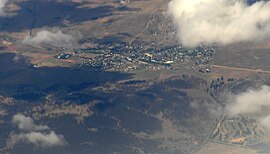Berridale, New South Wales
|
Berridale New South Wales |
|
|---|---|

aerial view from north west
|
|
| Coordinates | 36°21′24″S 148°49′22″E / 36.35667°S 148.82278°ECoordinates: 36°21′24″S 148°49′22″E / 36.35667°S 148.82278°E |
| Population | 844 (2006 census) |
| Established | 1863 |
| Postcode(s) | 2628 |
| Elevation | 860 m (2,822 ft) |
| Location | 435 km (270 mi) from Sydney |
| LGA(s) | Snowy Monaro Regional Council |
| State electorate(s) | Monaro |
| Federal Division(s) | Eden-Monaro |
Berridale is a small town of 844 people in New South Wales, and was the administrative centre of the Snowy River Shire until that shire merged with two others to form the Snowy Monaro Regional Council in 2016, one of Australia's major inland tourism destinations. Berridale lies at 860 metres above sea level between the towns of Cooma and Jindabyne and 435 kilometres south of Sydney.
Berridale has a definite four seasons: with potential snow during winter despite being below the snowline and temperatures reaching sweltering 40 degrees Celsius in the summer months of December to February. During summer, the average temperature ranges from a minimum 9° Celsius to a maximum of 28°. During the wintertime, the minimum temperature can go below −5° while the maximum temperature can rise as high as 16°. Berridale's climate is relatively dry as the town is located in a rainshadow on the Monaro between the Snowy Mountains and the coastal zone.
The land surrounding the town is a combination of cleared farmland and lightly wooded bush. There are granite boulders located south through west of the town on the roads to both Jindabyne and Dalgety. This granite was crystallised as a large mass from magma 400 million years ago miles from the Earth's surface and was gradually eroded and uplifted to its current position. The hills immediately to the north of the town have less granite. There are, however, a few small areas of shale.
Aborigines long occupied the area but in small numbers. The European settlement was founded in the 1860s, when Scotsman William Oliver built his house there in 1863 and opened a roadside store, naming the location as a variation on his home town in Scotland, Berriedale. The dry climate later proved the town ideal for growing fine merino wool. Oliver's store became a wayside inn in 1870, which still exists as the Berridale Inn, and a granite store was built. A post office opened in the town in 1869 with a telegraph office opening in 1870.
...
Wikipedia

